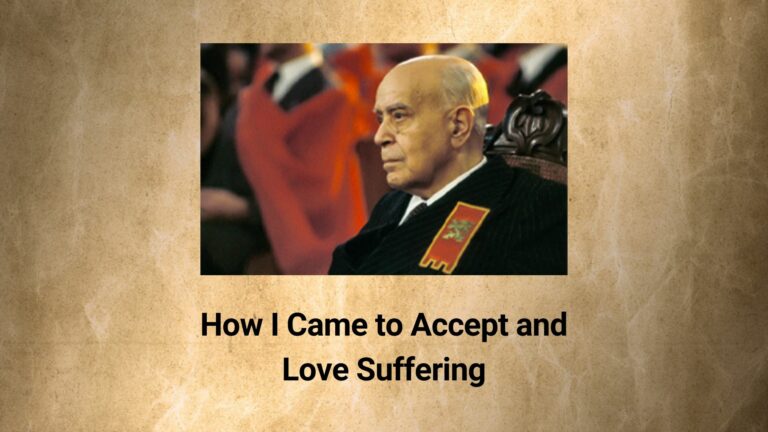
How I Came to Accept and Love Suffering
By Plinio Correa de Oliveira
Someone asked me how I came to love suffering. To answer this question, we need to realize that, naturally speaking, nobody loves suffering; it horrifies us.
For example, I am horrified by the thought of a drop of boiling water or, even worse, a drop of sealing wax falling on my skin. It will form a blister and complicate my life until it stops hurting, the wax drop is removed, and things are normalized. I do not want things like this to happen to me. We all have a horror of suffering.
Imagine someone saying to a person who will be returning to Spain, “You will get some bad news when you arrive in Madrid.” The person will be worried during the trip and think, What will this bad news be? He will scour the horizon, wondering about the source of this bad news. Everyone has a horror of suffering.
Thus, you might ask how I came to like suffering since it is so contrary to our desires.
Like everyone else in my early youth, I had around me people who suffered and those who did not.
Those who did not suffer at least appeared to be leading a perfectly comfortable and enjoyable life. Everything seemed fine with them.
Those who suffered a lot clearly showed their sorrows.
Thus, I could contrast the two groups and reach some conclusions.
I noticed that the people who led pleasant lives were selfish and indifferent to the concerns of others. Their vulgarity horrified me. They only spoke about and were interested in banal things.
On the other hand, I noticed those who suffered had more lofty concerns. They were interested in doctrine, religious topics, and other such issues. Even their vocabulary was more beautiful. They employed lovely words to express their thoughts. Those who didn’t suffer possessed an indescribably ordinary vocabulary.
I came to appreciate the value of suffering even more by observing the people in our household. My home was one of those old houses with lots of servants. In those days, it was easy to have many servants because society was not highly industrialized.
There were many maids, including those who suffered much and often. For example, we had two maids who were cousins, one a cook and the other a laundress. They had very upright bearings and the faces of people who had overcome all life’s vicissitudes.
The cook’s name was Florence, and her cousin, the laundress, was Magdalena.
Magdalena was full of aches and pains. She had rheumatism in her hands. Despite these problems, all she wanted to do was wash clothes. She was always very ill. I would often see her talking with my mother, Dona Lucília. Needless to say, Dona Lucília felt sorry for her and helped her in any way she could.
I noticed that Magdalena prayed a lot and was pious. She passed by us respectfully like a shadow along the wall. She wore a spotless white cloth on her head, like a headdress I’d never seen anyone use.
Thus, I had respect for the laundress but no special respect for Florence, who was more easygoing and enjoyed the good things in life. I appreciated this washerwoman who was a sufferer. No one cared about her. However, I saw how suffering gave her soul more value than some of the beautiful, perfumed and jeweled ladies who visited our home.
I then understood that suffering is the thing that most elevates a person’s soul. No person on earth is more destitute than one to whom God does not send pain and suffering. In this way, I began to sympathize with suffering.
I also came to understand suffering in the context of the struggle of Revolution and Counterrevolution, that is, those who fight for and against Christian civilization.
I realized that those who suffer are more Counterrevolutionary than those who don’t suffer. This is because those who don’t suffer are generally happy with how things are and are engulfed in pleasure. They get along with the Revolutionary world.
Those who suffer typically have some point of friction with the Revolution, either because they don’t want the Revolution or because the Revolution doesn’t want them. The Revolution doesn’t like suffering people and hides them as much as possible. It keeps silent about suffering people. That is one more reason I began to greatly respect suffering.
This respect increased yet more when I started to suffer. I notice that my soul made progress through suffering. When I was very young, I went to a primary school called Colégio São Luís. I found classmates and others there who were influenced by the Revolution, and I clashed with them. For a young boy, this suffering was immense. I felt I had reached the limits of what I could endure; such was the tortuous situation. However, I also saw how this suffering did me good. I grew in my capacity to suffer and developed qualities. I even perceived that this suffering made me more intelligent.
I later related these lessons on suffering to the Cross of Our Lord Jesus Christ and understood the great lesson He gave us in His Passion. I came to understand the role of Our Lady of Sorrows in helping me endure these trials. All this inspired in me a great respect for suffering.
From these observations, I concluded that a man is worth something only to the degree he suffers. If he can’t suffer, he is worth nothing. The same applies to those who lack the capacity to suffer.
There is one final consideration when dealing with suffering.
I found that some sufferings in life seem to exceed my ability to deal with them. Even at a young age, we can face some sufferings that are so intense that we feel we don’t have the courage to confront them. Sometimes, the simple struggle against a moral defect is so hard that we don’t dare face it.
I have been prostrate by these trials several times throughout my life. However, I eventually understood that strength comes from praying to Our Lady. It is an arduous struggle. Relief does not, or might not come immediately. If we pray, pray and pray, Divine assistance really comes.
When lacking strength, pray for it to come. No man has the right to say he did not have the strength if he did not ask for it. By asking, we receive.
We can have recourse to Saint Bernard’s prayer, the Memorare:
“Remember, O most gracious Virgin Mary, that never was it known…”
This prayer is one of the most beautiful prayers in the Catholic Church. It is very categorical. Notice that it says never was it known!
“…that anyone who fled to thy protection, implored thy help or sought thy intercession, was left unaided…
In other words, no unworthy creature on earth has ever asked for her support and not received it. That is what I am, the last of men.
However, I am a man and, therefore, her son. That is why I come to ask a favor. I am confident that she will not deny me that which she would not deny to anyone, even criminals or Judas if he approached her with a contrite heart.
“Inspired with this confidence, we fly unto thee, O Virgin of virgins, my Mother. To thee do I come. Before thee, I stand, sinful and sorrowful.”
At this point, the prayer mentions sin. I am not praying to her as a good or upright man but as a sinner. I have sinned so much that my sins have brought me to the ground; I groan under their weight but prostrate myself at her feet.
Then comes the final sentence:
“…O Mother of the Word Incarnate, despise not my petitions, but in thy mercy hear and answer me. Amen.”
With such a prayer, we can all acquire a love of suffering.
This article was adapted from an informal talk given by the author on August 23, 1983 in São Paulo, Brazil.

